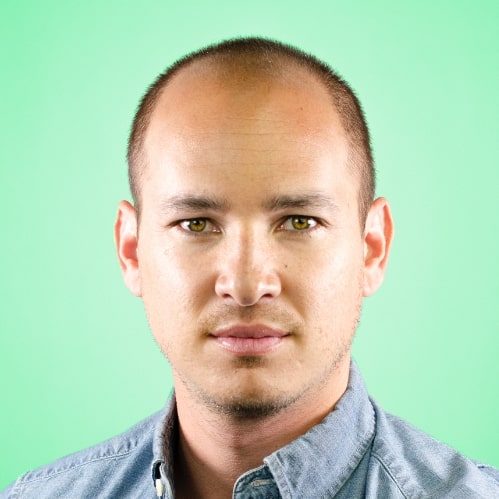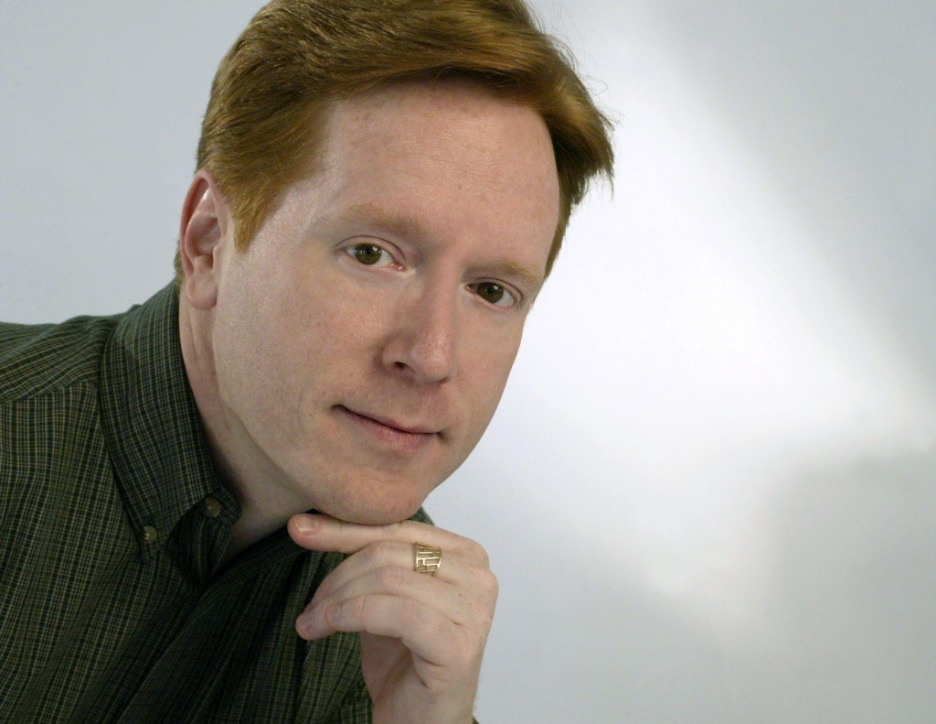
Dr. William Merchant, Assistant professor in Applied Statistics and Research Methods, discusses his recent Speaker Series presentation on the search for patterns that create our reality(s).
My name is Will merchant and I'm an assistant professor in the department of applied statistics and research methods.
My career has jumped around a lot in different fields. I've been in Psychology and Program Evaluation and music teaching. And I have a variety of interests too. And I typically like to use my interests to inform my other interests. And overall, this time I've been thinking to myself, how can I take all of my interests and use them to explain each other in what to me seems in a very complete way. I guess that's kind of what brought me to this point with this Doc Talk. I finally just wanted to get my ideas together.
Would you like to share about what the doc talk was?
Sure. The doc talk was called decoding your world. Who Wants to know? And so I just start off like I do in my classes, I take these terms that I use and I break them down. So first I just look at what is decoding? Cause most people know what decoding is intuitively, but it's difficult to explain and I've been getting a lot of practice with this sort of thing cause I've got a toddler who is almost turning four and he's always asking me to define these terms like "what is sad?" "What is happy?" "What is garbage?" Or anything like that. And so I'm always taking these very simple things and trying to explain them. So decoding is taking something that you don't understand and looking for patterns in it until you do understand it. That's what decoding is like a decoder ring or a secret message, that sort of thing.
And so I think, okay, that's very interesting to me. So what are things you can decode? What are some things that are complicated that you can get look for patterns in and then get answers about? Well, it could be literally anything. It could be your life is someone's life might be very complicated and they can't make heads or tails of it. There are ways to approach that systematically looking for patterns. Same thing with hospitals. They might be having a budget problem or anything like that and they need to decode something that is confusing. So that's decoding and the "who wants to know?" is the part that came after that. The basic idea with wants to know is, I knew this psychologist back at Kent state who is very, very smart, Mark Savickas, and he said, when somebody asks you a question, they tell you more about what they think about the world, then your answer will give them. And so this idea who wants to know, the main idea is that if you're asking a question about a school or a hospital or anything like that, or even yourself, the fact that the question exists is actually more informative to the system that created the question, then that little answer is going to give you.
Right. Is part of your doc talk your research as well?
I do include some of my research, but more as a backdrop to show how you look for patterns and situations. So, I guess overall, the doc talk was about looking for patterns and once you find some patterns, how can you use them to describe certain things to other people and to understand them yourself and apply methods to them
What, what sort of patterns do you talk about or are you interested in?
All patterns. But mainly what I'm interested in with patterns is that what a pattern is you have a very specific event and then a pattern is something that creates the event to a degree. For example, imagine you have the numbers like 1, 2, 4, 7, 11. I'm sure you're not writing those, nobody's writing those down, but.
I felt like I should have.
The idea is that this pattern is a very specific series of numbers. But what it actually is the way you make the pattern is, from 1 to 2 is one, from 2 to 4 is two, from 4 to 5 is three, and from 7 to 11 is four. So the pattern is every time you go up a number, you add another number to the space. And so that's the pattern that generated the sequence. And then if you take that one, two, three, four sort of pattern, you go one level up and there's just spaces of one between those, those numbers. So there is a pattern called one, one, one, that's generally the pattern one, two, three, four, which are generated the pattern 1, 2, 4, 7, 11. And so essentially what we're doing is we're taking a specific situation and looking for a pattern allows us to strip away the specifics. And once you strip away the specifics, you can analyze the pattern, find out what's going on.
Another basic example, say you're in a counseling situation and somebody comes through with a very long drawn out story about this fight they had and blah blah blah. If you're looking for a pattern there, you might be able to very simply say, well, you got in a fight with this person, "It sounds like they made you mad about this and that bothers you because of this." So it might've been a very long story, but it's actually just three variables or three dynamics. So that's what I mean when looking for patterns, what are the things that are making something happen? That's the main idea.
You mentioned a few things in your Doc Talk. You talk about religion and philosophy and, and almost creating a kind of like a way of, and you also mentioned mysticism. Would you mind going into detail anywhere around this realm? Cause those are, those are big topics so we don't really have so much time on that, but where does that fall in?
Well, I mainly got this original idea from this rockstar named Andrew W.K. And he has an advice column too. He's a very cool dude. And in this advice column, one of his fans wrote in and said that his very religious uncle was going to come over for Thanksgiving and he didn't want to hear about religion cause he was an atheist. He just wanted to think about science. So, he's complaining about that. And Andrew WK very smartly said, well both science and religion are methods that people use to interact with reality and understand reality. So they're both essentially two sides of the same coin. So that's kind of how you can get into mysticism or science or philosophy. All of these things are just ways that we, in a very basic sense, the ways that we subjectively try to understand the world. And then we call it objectivity when we apply numbers or generalization and things to it.
And you mentioned about what is real and I really like your explanation. I was hoping you could, you could kind of, emulate that.
Sure. “What is real?” Okay. Well I took this actually from Webster's dictionary online and what was real was something that exists on its own and is not dependent on anything else for its existence. So, a cup is real, a table is real. I'm real. Any sort of physical or something that exists independent of other things can be described as real based on Webster's dictionary. And then it said, reality is the space containing real things, things that are independent, not interdependent. And so I thought that was very interesting because within I realized is that there are many things that we can't communicate without relating them to something else. And so, I'm just full of questions. I don't know if something is unreal because it can only be communicated by relating it to something else or if we perceive things as real, but then we have to relate them to other things to communicate them.
It's sort of the tree falling in the woods idea or the chicken or the egg. I don't know what is real. And so I, I guess when I'm talking about what's real, I want to find out, okay, well if I can't actually determine what is real from these definitions... We can say this table and everything is real. But how do you sort of talk about what's real? I guess? I dunno. How do you find out who you are? Cause that's who's perceiving the reality, I guess.
Does any of the things that we've already discussed fall into the classroom? Did you show this to the students,
Yeah, absolutely. For example. We're talking about counseling stories. You know, if someone brings in a complicated story, can you strip it away to look at the important parts that are going to be impactful and have a lot of levers in that person's life. The same thing happens in research methods. And I do this in all my classes. I'm doing it right now in SRM 600, intro to graduate research. So you've got a complicated study or a complicated scenario you want to look at. A difficult thing for people to do typically is to take something they want to know about and organize it in a way that can be studied statistically or quantitatively. And what there are, there are collection of models that we use and that can be a kind of confusing term, but what it mainly is, is asking what are you actually doing in your study? Are you comparing things? Are you seeing, what's the relationship between things? Are you trying to explain things? Are you trying to predict something or are you trying to describe something? And so if you have any one of those five things, you decide based on what your questions are and then from then you can go on to actually pick us statistical analysis. So for example, if you want to compare two things, that's typically a T-test. If you want to compare three things or more, that's an ANOVA. If you want to compare three things across multiple scales, multiple outcomes or dependent variables, that could be a MANOVA if you want to see how two things change or one thing changes another thing, that can be regression. And so when we're talking about regression or these comparisons, those are the basic models we use in statistics. But what they actually do is they represent something that very complicated having in the real world. But what we've done is we look for a pattern, the pattern of the pure relationships we're interested in and removed the specifics to only look at the workable components for in our pattern. So that's kind of how you take it from that complicated level to a simple level of patterns. Cause that's all it is. It's reducing something down to its ingredients.
And then being able to explain the sequences in which you formulate those, those patterns.
Yeah. And sometimes it's very difficult for people just to look at something complicated they want to know about and break it down into the most important parts because you do have to discard some stuff sometimes or you gotta tweak it to fit in a model. So that's another thing I'm pretty interested in is how, how much specific information can you remove from the system while it still contains the important stuff
And would you say overall are your quantitative only in this area?
I came in mostly a quantitative background, but I'm more mixed as well. So I do a little bit of qualitative, but I'm certainly not a qualitative scholar at all. I guess I'm mostly in program evaluation, which is just how do you determine if something is good or bad, working or not working, based on the perceptions of the people you're working with, the stakeholders who want you to evaluate something. And why are they asking the question? What do they want to know? What is the organization? Who are they? In very basic senses.
If you had any books to recommend, what would you recommend?
I like humor a lot because in comedy, because what it does is it takes the situation you're looking at and then it sees it from a different angle. And that's where the joke is. So I love that. I mean, I like books where people come up with their own theory of everything. And what a theory of everything, people call it a TOE and their little TOEs and big TOEs.
So a little toe, TOE explains one system completely. It's an integrated system. A big TOE is a theory that explains everything. So a little TOE could explain physics or math or psychology. A big toe would have to integrate objectivity and subjectivity into the one theory. And so there are a couple, there's one called My Big TOE, and it's just this ex-NASA physicist describing how he believes he's integrated subjectivity and objectivity, Tomas Campbell.
There's also Ken Wilber. He's a pretty excellent philosopher. He has a book called A Brief History of Everything. He also has a book called A Theory of Everything. So it's his own crack at a theory of everything. There's also atma vichara, which is a sort of self-enquiry meditation, essentially finding out, when you perceive something, it means that you have to be separated from it in order to perceive it. So I can perceive this table because my eyeballs are separate from it. And then I can see it cause there's distance. And so this atma vichara, what it also does is it looks at ideas that come up in your mind and says, well, who's thinking those ideas? And you go back one level deeper into your identity and you keep doing this until you go to some sort of root of your identity, "who's perceiving it?" That sort of thing. And this works too with hospitals and schools by asking who's asking the question, who wants to know and very, very important questions in program evaluation.
The ASRM, the applied statistics and research methods program is great. We've got a master's and a PhD and we do a lot of really excellent stuff. Working with complex models and simple models. How do you just understand the world better and conduct good research? Because that's all research is. It's exploring the world and trying to get good answers for things or exploring things in systematic ways. So we have qualitative, we've got great statistics professors. I do program evaluation. We do a lot of good stuff so come on over.
Music:
Podington Bear - Stages Of Awakening
A A Aalto - Trot Tune





